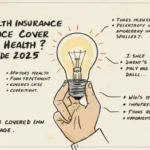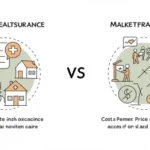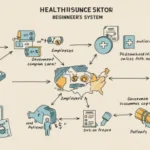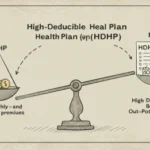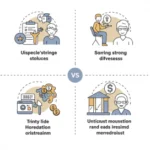Introduction: Why People Consider Short-Term Health Insurance
Short-term health insurance, also known as temporary or gap insurance, is designed to provide coverage for a limited period—typically from a few weeks up to 12 months. It’s often marketed toward people who are between jobs, waiting for employer coverage to begin, or seeking a lower-cost alternative to traditional health insurance.
But is it really worth it?
In this article, we’ll break down what short-term health insurance is, how it works, and most importantly, its pros and cons—so you can decide if it’s the right choice for your situation.

What Is Short-Term Health Insurance?
Short-term health insurance is a type of limited-duration coverage that is typically offered by private insurance companies. Unlike traditional ACA (Affordable Care Act) plans, these policies are not required to cover essential health benefits such as maternity care, mental health treatment, or prescription drugs.
Key Features:
- Coverage typically lasts 30 to 364 days (some plans renewable up to 36 months, depending on state law)
- Not ACA-compliant (does not meet minimum essential coverage requirements)
- Generally lower premiums than ACA plans
- Often requires medical underwriting (pre-existing conditions may not be covered)
Who Typically Buys Short-Term Plans?
Short-term health insurance is most commonly used by:
- People between jobs or recently unemployed
- Those waiting for Medicare or employer benefits to begin
- Recent college graduates or early retirees
- Individuals who missed the ACA open enrollment period
- People looking for budget-friendly premiums
While it’s not suitable for everyone, it can be a temporary solution for those needing basic medical protection.
Pros of Short-Term Health Insurance
1. Lower Premiums
The biggest selling point of short-term plans is affordability. Monthly premiums are significantly lower than ACA-compliant plans—sometimes even half the cost.
2. Quick Enrollment
You can often get coverage within 24 hours of applying. There’s no need to wait for a specific enrollment period.
3. Flexible Terms
Policies can be as short as 30 days or up to a year, depending on your needs. Some states allow renewals for up to 36 months.
4. Good for Healthy Individuals
If you’re young, healthy, and don’t expect major medical expenses, short-term plans can offer basic protection at a reduced cost.
Cons of Short-Term Health Insurance
1. Limited Coverage
Most plans do not cover pre-existing conditions, preventive care, maternity, mental health, or prescription drugs.
Example: If you’ve had asthma, diabetes, or high blood pressure, you may be denied coverage or face exclusions.
2. High Out-of-Pocket Costs
Even though premiums are low, deductibles can be high—sometimes $5,000 to $10,000. Also, co-pays and coinsurance are typically less generous than standard plans.
3. No ACA Protections
These plans are not regulated under the ACA, which means:
- No guaranteed issue
- No essential health benefits
- No subsidies or tax credits
- No lifetime benefit caps (on the contrary—some impose maximums)
4. State Restrictions
Some U.S. states have banned or heavily restricted short-term plans due to their limited consumer protections.
5. Can Be Misleading
Some insurers use marketing tactics that make these plans seem more comprehensive than they are. Always read the fine print.
When Is Short-Term Health Insurance a Good Idea?
Short-term plans may work well if:
- You’re waiting for other insurance to begin (e.g., new job, Medicare)
- You’re in between enrollment periods
- You want to avoid being entirely uninsured
- You’re relatively healthy and have low medical needs
However, they’re not recommended if you:
- Have ongoing or chronic health conditions
- Need regular prescriptions
- Are pregnant or planning to become pregnant
- Want protection from unexpected major medical bills
Example Scenario
Emily, a 28-year-old freelancer, loses her client contract and doesn’t qualify for Medicaid or COBRA. She’s healthy, takes no medications, and expects to find a new job in 2–3 months.
For her, a short-term plan with a $100/month premium and $5,000 deductible might provide temporary peace of mind in case of an accident—as long as she understands what it won’t cover.
Short-Term Insurance vs. ACA Plans
| Feature | Short-Term | ACA Plan |
|---|---|---|
| Covers pre-existing conditions | ❌ | ✅ |
| Maternity care | ❌ | ✅ |
| Mental health & substance use | ❌ | ✅ |
| Prescription drug coverage | Limited | ✅ |
| Premium cost | Lower | Higher |
| Enrollment | Anytime | Open enrollment only |
Should You Buy a Short-Term Plan?
It depends on your situation. Ask yourself:
- Can I afford unexpected out-of-pocket expenses?
- Am I healthy enough to risk a policy with exclusions?
- Do I understand what is not covered?
If you’re only looking for emergency coverage for a short time and can tolerate the risk, it might make sense. Otherwise, consider ACA marketplace plans, Medicaid, or state-specific options.
Conclusion: Weigh the Risks Before You Buy
Short-term health insurance can serve as a temporary safety net, but it’s not a long-term solution. Its low cost comes at the expense of reduced benefits and higher financial risk.
If you’re exploring short-term options, make sure to compare multiple plans and read all coverage exclusions. When in doubt, speak with a licensed insurance agent to understand what you’re getting—and what you’re not.

For more guides like this, check out our Insurance News section:
https://healthmanual.net/category/insurance-news/
We regularly publish simplified insurance breakdowns to help you make smarter healthcare decisions.

Hi, I’m Hibiki — the writer behind HealthManual.net.
I cover health insurance news, wellness tips, and insightful analysis of pharmaceutical and healthcare stocks. My goal is to simplify complex topics and make health and finance information more accessible to everyone.
Thanks for reading — I hope you find the content helpful and reliable.



